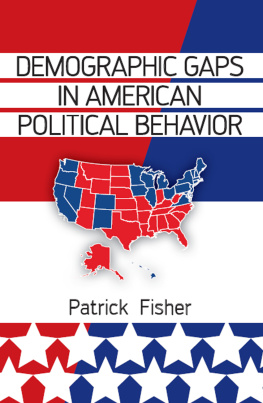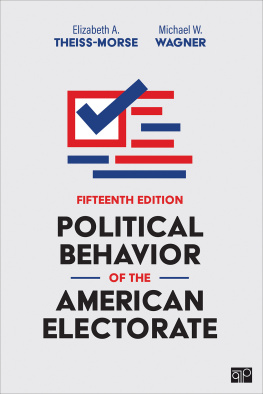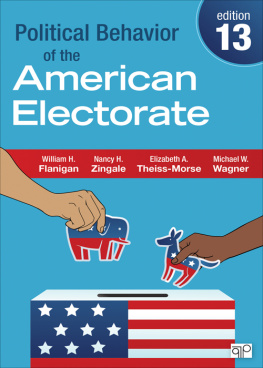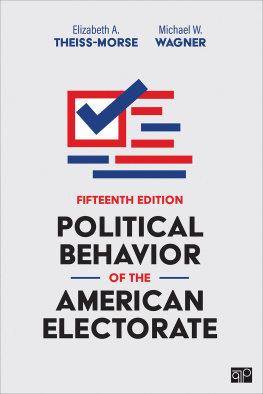Demographic Gaps in American Political Behavior
Demographic Gaps in American Political Behavior
PATRICK FISHER
Seton Hall University
First published 2014 by Westview Press
Published 2018 by Routledge
711 Third Avenue, New York, NY 10017, USA
2 Park Square, Milton Park, Abingdon, Oxon OX14 4RN
Routledge is an imprint of the Taylor & Francis Group, an informa business
Copyright 2014 Taylor & Francis
All rights reserved. No part of this book may be reprinted or reproduced or utilised in any form or by any electronic, mechanical, or other means, now known or hereafter invented, including photocopying and recording, or in any information storage or retrieval system, without permission in writing from the publishers.
Notice:
Product or corporate names may be trademarks or registered trademarks, and are used only for identification and explanation without intent to infringe.
Every effort has been made to secure required permissions for all text, images, maps, and other art reprinted in this volume.
Library of Congress Cataloging-in-Publication Data
Fisher, Patrick (Patrick Ivan)
Demographic gaps in American political behavior / Patrick Fisher.
pages cm
Includes bibliographical references and index.
ISBN 978-0-8133-4596-3 (paperback) ISBN 978-0-8133-4597-0 (e-book) 1. Political participationSocial aspectsUnited States. 2. Political cultureUnited States. 3. Political socializationUnited States. 4. DemographyPolitical aspectsUnited States. 5. IncomePolitical aspectsUnited States. 6. Religion and politicsUnited States. 7. WomenPolitical activityUnited States. 8. MenPolitical activityUnited States. 9. RacePolitical aspectsUnited States. 10. AgePolitical aspectsUnited States. I. Title.
JK1764.F528 2014
323.0420973dc23
2013050469
ISBN 13: 978-0-8133-4596-3 (pbk)
Contents
I have long been fascinated by the intricacies of American elections. Even as a first-grader I recall being captivated by the Jimmy CarterGerald Ford election and remember being shocked the day after the election when I woke up and found out that Carter had won the electionafter all, Ford had been leading when my parents forced me to go to bed on election night. Needless to say, these days I do not go to bed early on election night: I live for presidential and congressional elections. It is like the Super Bowl, World Series, and Olympics combined in one intense night every four years.
For the first part of my career as a political scientist, my research focus was primarily on the federal budget process, a topic on which I wrote two books: Congressional Budgeting: A Representational Perspective (University Press of America, 2005) and The Politics of Taxing and Spending (Lynne Rienner, 2009). Even as I was writing about budgetary politics, however, I found myself continually being drawn to the minutiae of American elections, and after getting tenure at Seton Hall University, I thought it was the right time to finally concentrate on my interest in American political behavior.
I got the idea for writing a book on the demographic gaps in the American polity from the New York Times article In Politics, the God Gap Overshadows Other Differences, published on December 9, 2006. While reading this fascinating article by Peter Steinfels, I found myself wondering how other demographic gaps would compare to the god gap and the preliminary concept for this book was born. My initial foray into the study of gapology was research on the age gap in US politics, which resulted in a couple of articles published in the journal Society. After a considerable amount of positive feedback on my age gap findings, I was encouraged to make the plunge and write this book analyzing a number of different demographic gaps in American politics. I hope you will find these gapswhich tell us so much about American politicsas interesting as I do.
Of course, no body of work is done without the help of others, and I want to acknowledge all the invaluable support I received in the undertaking of this project. I was awarded a University Research Council Award by Seton Hall University in 2011 in support of my research on this book and wish to thank the university for its commitment to me in this research endeavor. I express gratitude to Michael Taylor and Jeffrey Togman, my colleagues in the Department of Political Science at Seton Hall, for all the moral support they have given me through the years. Once I decided to make gapology my research focus, I annually taught senior seminar courses at Seton Hall on the topic, and I wish to acknowledge all my senior seminar students, who so usefully served as a laboratory of ideas for this book. I particularly want to recognize Kaitlyn Aurilio and Tyler Marandola, two stellar students of mine who provided substantial help in my research on this project. I thank Ada Fung and Anthony Wahl at Westview Press for all their support. I sincerely value the opportunity offered to me by Westview to write this book and appreciate all the critical work Ada and Anthony provided me. Finally, I want to thank the peer reviewers who took the time to offer their insightful feedback: Matt Guardino (Providence College), Whitt Kilburn (Grand Valley State University), Seth McKee (University of South Florida), John McNulty (Binghamton University), Jeffrey Stonecash (Syracuse University), Costas Panagopoulos (Fordham University), and others who wished to remain anonymous.
This work will investigate the gapology of American politics. Gapology, simply put, is the study of political gaps, or divides. Though the concept of gapology can be used to denote the differences between viewpoints (e.g., liberal or conservative) and situations (e.g., married or single), my focus will be the study of marked political disparities between groups (e.g., male or female) in the United States.
Ones demographic background has the potential to greatly influence how one views politics and behaves politically. As such, this book will examine the political beliefs and behavior of different demographic groups in the United States. By studying American political culture from a demographic perspective, I will endeavor to come to a greater understanding of how Americans conceptualize the political universe. How are different demographic groups politically distinct in American democracy? Why are they distinct?
Americans are divided on a wide array of political divisions that go beyond the red (Republican or conservative) and blue (Democratic or liberal) state classification that has become so ingrained in popular discourse. Media coverage has disproportionately focused on the red state versus blue state divide, leaving the impression that American political behavior is determined by place or residence. This, however, ignores the numerous other divides in American political behavior. What it means to be red or blue is much more complex than geography. There are considerable demographic political divisionswhat I will refer to as gapsthat differentiate red America from blue America. The many political gaps in the United States distinguish the political behavior of Americans and are extremely useful in understanding the political divides within the United States today.
The central mantra of this book is that the gaps in American political behavior are not only intrinsically fascinating but also informative. People unquestionably respond to gaps. Americans perceive themselves as belonging to one group or another, and there is widespread acknowledgment that these group memberships affect political beliefs and voting choices. The focus of gapology is on the demographics of the American polity.














